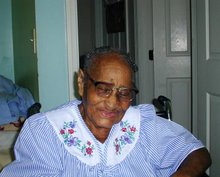If I could buy a good nights rest at the local pharmacy I would. I am exhausted! Muddear has been waking up at all hours of the night and early morning for the past two weeks, and believe me, she doesn't wake up quietly! She moans...and yells...and prays at the top of her lungs for numerous reasons. She is short of breath...she needs a tissue...she wants her door shut...her feet hurt. Faithfully, I go to Muddear's room to assist with the immediate need and hope with all hope that she will go back to sleep. However, as I am sure you can guess, sleep is not immediately reclaimed. Once the issue has been addressed either another occurs between 30 minutes to an hour later and she begins to call me again or she remains awake for the night.
This is not the first time Muddear has had sleepless nights. She often suffers from Sundown syndrome -- also called sundowning or sunsetting, a behavior common in people with Alzheimer's disease or Dementia. It describes the confusion, anxiety, agitation, or disorientation that often occur at dusk and into the evening hours. The episodes may last a few hours or throughout the night. For more information about Sundown syndrome, go to my "Favorite Links," click on WebMd and search "Alzheimer's Disease:Frequently Asked Questions."
Since my grandmother has come to live with me, I have come to value things that I often used to take for granted. A good nights sleep, quiet time, a long hot shower, and reading a good book are hot commodities.
Tips For Caregiver's
People with Alzheimer's disease frequently become more disoriented after dark or when waking. Leaving a night-light on in the bedroom may be helpful.
~WebMd
~WebMd
Subscribe to:
Post Comments (Atom)
.jpg)








No comments:
Post a Comment